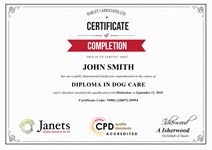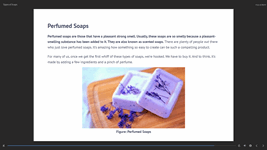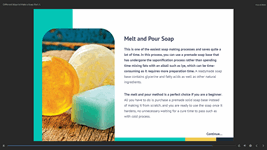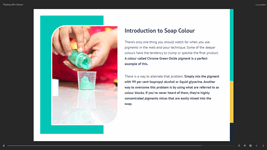DIY Soap Making Diploma - CPD Certified
Free PDF Certificate | Tutor Support & Assessment Included | 1 Year Access
Janets
Summary
- Exam(s) / assessment(s) is included in price
- Tutor is available to students
Add to basket or enquire
Overview
One Day Only! Get it Before it’s Gone: Our Biggest End Of Season Sale Ever!
Better Route for Quicker Growth Opportunity with Limited Time; Grab This Offer Now!
Have you given up looking for a course that can improve your understanding and help you to bloom? If so, you've come to the right spot because our tactfully crafted DIY Soap Making course will help you go one step closer to achieving your goal.
Get our premium course with a Free PDF Certificate at an unbelievable price
Each session in this course is thorough and easy-to-understand. The extensive course materials of DIY Soap Making are accessible at any time and from any location, allowing you to study at your own speed in the comfort of your own home. Throughout the course, you will receive tutor support, and our helpful customer service is available around-the-clock to help you with any problems you might face while studying the DIY Soap Making.
What You Get Out Of Studying With Janets
- Free PDF certificate upon successful completion of the course
- Full one-year access to course materials
- Instant assessment results
- Full tutor support available from Monday to Friday
- Study the course at your own pace
- Accessible, informative modules taught by expert instructors
- Get 24/7 help or advice from our email and live chat teams with the training
- Study at your own time through your computer, tablet or mobile device
- Improve your chance of gaining valuable skills by completing the course
Enrol in the DIY Soap Making course to find out more about the topic and get one step closer to reaching your desired success
Course media
Description
The course is delivered through Janets’ online learning platform. The DIY Soap Making has no formal teaching deadlines, meaning you are free to complete the course at your own pace.
Course Curriculum:
Module 01: Introduction to Soap Making
- What Is Soap?
- Saponification
- Why Making Your Own Soap?
- Natural Soap and Organic Soap
Module 02: Types of Soaps
- Novelty Soaps
- Perfumed Soaps
- Guest Soaps
- Beauty Soaps
- Medicated Soaps
- Soaps Containing Glycerin
- Transparent Soaps
- Liquid Soaps
- Kitchen Soaps
Module 03: Soap Making Ingredients
- Lye
- Water
- Fats
- Colourants
- Fragrances
- Botanicals
- Additives
Module 04: Equipment for Soap Making
- Essential Equipment
- Useful Extras
- Soap Moulds
Module 05: Different Ways to Make A Soap: Part-1
- Melt and Pour Soap
- Making Hot Process Soap
- Rebatching
Module 06: Different Ways to Make A Soap: Part-2
- Introduction to the Cold Process
- Basic Ingredients
- Method of Cold Process Soap Making
Module 07: Understanding Oil Choices
- Apricot Kernel Oil
- Avocado Oil
- Beeswax
- Canola Oil
- Castor Oil
- Cocoa Butter
- Coconut Oil
- Hazelnut Oil and Jojoba Oil
- Mango Butter and Meadowfoam Oil
- Olive Oil
- Palm Oil
- Palm Kernel Oil and Peach Kernel Oil
- Rice Bran Oil and Shea Butter
- Sunflower Oil
- Sweet Almond Oil and Tallow
Module 08: Playing with Colours
- Introduction to Soap Colour
- How Much Is Too Much?
- Colour and Your Oils
- The Colour Basics
- Using the Colour Wheel
- Storing Soap to Keep Colour Vibrant
Module 09: Make Your Own Soap Bars: Part-1
- Rose Swirls
- Pure Baby’s Breath
- Orchid Swirls
- Geranium and Violet
- Lavender and Hops
- Sunshine Calendula
Module 10: Make Your Own Soap Bars: Part-2
- Rosemary Mint Soap
- Lavender Soap
- Lavender Rosemary Soap
- Lavender Honey Soap
- Soothing Aloe Vera Soap
- Lavender and Peppermint Antiseptic Soap
- Soothing Chamomile Soap
- Turmeric Soap
- Chest Decongestant
Module 11: Special Soap Recipes
- Special Soaps
- Soaps Inspired by food
Module 12: Soaps for Other Purposes
- Liquid Dish Soap
- Liquid Laundry Soap
- Skin Softening Dish Liquid
- Industrial Hand Cleaner
- Sink Stain Remover
- Kitchen Wipes
- Household Cleaning Paste
- Car Wash Soap
- All-Purpose Cleaner
- Smelly Doggy Soap
Module 13: Tips, Tricks and Precautions
- Do’s and Don’ts of Soap Making
- Tips and Tricks for Soap Making
- Soap Making Safety Guidelines
Module 14: Troubleshooting
- My Soap Will Not Trace!
- My Solid Soap Has Turned to Liquid!
- My Soap Has Separated in The Pot!
- My Liquid Soap Has Separated!
- My Soap Has Seized!
- My Soap Is Too Thick!
- My Soap Is Oily Soap!
- My Soap Has Water or Oil Pockets!
- My Soap Has No Fragrance!
- Other Common Problems
- When Is It Necessary to Give up and Throw Away a Batch of Soap?
Module 15:Frequently Faced Confusions
- Why Should You Use Distilled Water in Your Soap and How Much?
- Which Is Better to Use: Sodium Hydroxide Beads or Flakes?
- Can You Make Soap Without Sodium Hydroxide?
- What Does “Super Fat” Mean?
- Can You Create a Mild Soap without a Super fat/Lye Discount?
- How Can You Change the Size of Your Batch?
- Do You Need to Add a Preservative to Cold Process Soap?
- How Much Should You Stir Soap Batter before Using Additives?
- What’s Causing Your Soap to Go Brown?
- Can You Make Substitutions in Your Recipe?
- What Does Trace Look Like?
- Why Won’t Your Soap Trace?
- How Can You Slow Down Trace?
- Why Is Your Soap Taking So Long to Become Ready to Unmould?
- Why Does Your Soap Crack?
Module 16: Open for Business
- Starting a Soap Making Business
- Do You Have What It Takes?
- The Niche Market
- Developing and Testing Your New Products
- Where Do You Get Your Supplies?
Module 17: Selling Your Beautiful Handmade Soaps
- Start a Soap Making Business and Clean Up
- Initiate Marketing
- Five Easy Tips for Starting Up
- Five Ways to Sell More
Method of Assessment
To successfully complete the course, students will have to take an automated multiple-choice exam. This exam will be online and you will need to score 60% or above to pass the course.
After successfully passing the course exam, you will be able to apply for a certificate as proof of your expertise.
Certification
All students who successfully complete the course can instantly download their free e-certificate. You can also purchase a hard copy of the certificate, which will be delivered by post for £9.99.
Who is this course for?
The course is ideal for those who are interested or already working in this sector.
Requirements
No prior qualifications are needed for Learners to enrol on this course.
Career path
This DIY Soap Making course will assist you to get your desired job in the relevant field. The course will also progress your career, regardless of your present job status.
Questions and answers
Currently there are no Q&As for this course. Be the first to ask a question.
Reviews
Currently there are no reviews for this course. Be the first to leave a review.
Legal information
This course is advertised on reed.co.uk by the Course Provider, whose terms and conditions apply. Purchases are made directly from the Course Provider, and as such, content and materials are supplied by the Course Provider directly. Reed is acting as agent and not reseller in relation to this course. Reed's only responsibility is to facilitate your payment for the course. It is your responsibility to review and agree to the Course Provider's terms and conditions and satisfy yourself as to the suitability of the course you intend to purchase. Reed will not have any responsibility for the content of the course and/or associated materials.






